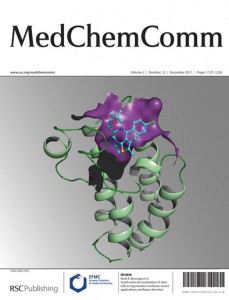 The web-based issue in MedChemComm termed “Epigenetics” is a timely collection of articles covering recent developments in epigenetic medicinal chemistry research in the broadest sense, including reviews of the field, original articles, and perspectives looking in to the future.
The web-based issue in MedChemComm termed “Epigenetics” is a timely collection of articles covering recent developments in epigenetic medicinal chemistry research in the broadest sense, including reviews of the field, original articles, and perspectives looking in to the future.
Epigenetics is the study of changes in phenotype or gene expression that cannot be related to a change in gene sequence. From being seen as a fringe science looking at strange phenomena, it is today very clear that epigenetic mechanisms are crucial for cell development and a cause of many diseases. In particular, many cancers have been shown to have an epigenetic component, and cancer research provided epigenetic compounds before the proteins involved were known, as exemplified by Breslow’s pioneering work on hydroxamic acids. Today several histone deacetylase (HDAC) inhibitors have reached the market, and this area is the most established part of the research field. Similarly, many other enzymes involved in epigenetic regulation are potential drug targets and development of new tool compounds to validate these targets and understanding the dynamics of epigenetic marks is a key requirement in the field. Fortunately, this need is balanced by increasing activity and interest from the medicinal chemistry community as we hope this issue clearly demonstrates.
It is therefore highly appropriate that MedChemComm has decided to gather a web-based issue on epigenetic medicinal chemistry research. This issue contains more than 10 papers on epigenetic research with contributions as concise articles as well as reviews from leading groups in the field. These papers demonstrate the broadness of the field including inhibitors of HDACs, DNA methyltransferases, protein-protein interactions of reader domains, and looking at the enzymatic action of lysyl hydroxylases.
We are very pleased with this issue describing and demonstrating state-of-art within epigenetic medicinal chemistry and hope the readers of MedChemComm will enjoy it.
–Rasmus Prætorius Clausen (University of Copenhagen) and Mark Bunnage (Pfizer), Guest Editors










